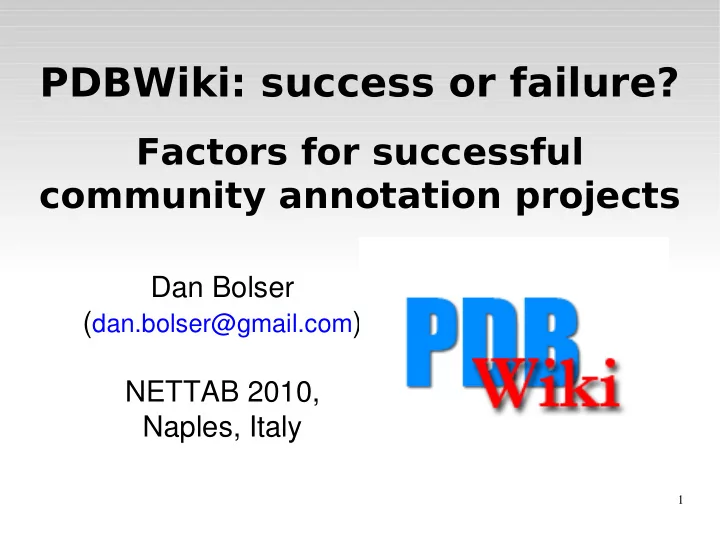

PDBWiki: success or failure? Factors for successful community annotation projects Dan Bolser ( dan.bolser@gmail.com ) NETTAB 2010, Naples, Italy 1
2
Motivation for this work • Opportunity to look at the strengths and weaknesses of the PDBWiki project – What did we learn? • Successes • Failures – How can we improve? 3
General principles for community annotation? 4
Rules for success 1) Useful content 2) Benefit to contributors 3) Recognition for contribution 4) Fun 5
Presentation overview Community annotation Why is it necessary? BioWikis: The Wiki Wiki Web! When does it work (or not)? 6
Community annotation 7
Community annotation 8
Community annotation Has been driven by two key factors: ● The vast increase in biological data ● The clear success of Wikipedia 9
BioMoore's Law Over time: − Cost per unit of information can be decreased by orders of magnitude. − Throughput is increased by orders of magnitude. Fan et al. 2006 . Nat Rev Genet . Comprehensive disease studies that might require ~1bn genotypes would now cost only a few million dollars. − Revolution in human genetics. 10
BioMoore's Law Over time: − Cost per unit of information can be decreased by orders of magnitude. − Throughput is increased by orders of magnitude. Fan et al. 2006 . Nat Rev Genet . Comprehensive disease studies that might require ~1bn genotypes would now cost only a few million dollars. − Revolution in human genetics. 11
Community annotation Centralised databases can't cope with annotating the influx of data. Less investment in more specialised data. Fewer people with a stake. Specialists more disparate. − Communities are smaller and more focused. Do wikis hold the answer? Wikipedia as a model… 12
The success of Wikipedia Wikipedia is consistently among one of the top 10 websites in the world ( http://www.alexa.com ) . Google > Facebook > YouTube > Yahoo! > Windows Live > Baidu > Wikipedia > ... 200k edits per day. 100k active users per month. WikiProject Molecular and Cellular Biology 13
14
But Wikipedia isn’t always the answer ... • Wikipedia is an educational resource. – All articles are encyclopaedic in style. – Explicitly forbids data from ‘original research’: • http://wikipedia.org/wiki/Wikipedia:No_original_research – “Wikipedia does not publish original research” . – No tools for the specific analysis, presentation, or collection of ‘biological’ data. • BioWikis! 15
BioWikis Wikis with a biological subject matter, customized for analysis, presentation and collection of specific biological data and biological data types: 16
What is PDBWiki? • Allows the protein structures in the PDB to be tagged with specific annotations. – Functions as a bug tracker for users of the PDB. – Stehr H, Duarte JM, Lappe M, Bhak J, Bolser DM. (2010) PDBWiki: added value through community annotation of the Protein Data Bank. Database . baq009 – http://pdbwiki.org 17
18
19
20
21
22
23
When does it work? 24
25
Rules for success(?) 1 Must provide useful content in a convenient way ) Focused, unique, organised, query-able data 2 Contributions should provide a direct benefit ) Self promotion / Functionality / Recognition 3 Contributors should be formally 'recognized' ) Visibility 26
These factors often depend on COMMUNITY 27
Building a community... Activation energy! You have to build up a resource before users will contribute! Kittur et. al. (2007) Power of the few vs. wisdom of the crowd. http://www.parc.com/publication/1749/power- of-the-few-vs-wisdom-of-the-crowd.html 28
Recognition • People work for recognition. – In science, this typically comes from publication of per- reviewed papers. – Why contribute to a wiki? • Perhaps this will get you a publication? • Peer review is not just about papers. – Contributors to Wikipedia are recognised among their peers! 29
Recognition • Alternative models of recognition. – Wiki edits are unlikely to impress anyone on a CV, however… – Community mailing lists are a great way to network. • http://biodatabase.org/index.php/List_of_mailing_lists_for_biologists – Recognition can come from contribution to community projects! 30
Game mechanics? (Fun) • Crowd sourcing – Using ‘the crowd’ to do useful work • Game mechanics – Applying Game Mechanics to Functional Software – http://www.youtube.com/watch?v=ihUt-163gZI • Ease of use, robust infrastructure, and recognition of user contributions are encapsulated by the simple idea of making the site ‘fun’. 31
PDBWiki is a success(?) 1 Must provide useful content in a convenient way ) Success: Met our need for a shared 'computational kill list' for the PDB. Fail: These feature can be made more convenient. 2 Contributions should provide a direct benefit ) Success: We collected mostly annotations of this type, and edits to the 'links' section were especially popular. 3 Contributors should be formally 'recognized' ) Fail: We didn't do a good job of clearly acknowledging our contributors. 32
Conclusions The wiki concept is a simple improvement on the original concept of the web. Sharing data. BioWikis must be fun and attractive for users. Structured wikis promise to change our idea of a ‘web database’. Read only databases will be hard to imagine. 33
Acknowledgements Henning Stehr and Jose Duarte for PDBWiki All the contributors to http://PDBWiki.org Jong Bhak for his BioWiki concept NETTAB organisers – Paolo, Angelo, Claudia, and others. Linus Torvalds for Linux, Rasmus Lerdorf for PHP, and all scientists who pursue their work with honesty and integrity. irc://irc.freenode.net/ #semantic-mediawiki #bioinformatics 34
References Wikinomics: http://www.ncbi.nlm.nih.gov/pubmed/18769412 EcoliWiki / Gene Wiki / OpenWetWare / PDBWiki / Proteopedia / WikiGenes / WikiPathways / … http://biodatabase.org/index.php/BioWiki Bioinformatics.Org wiki: http://bifx.org/wiki The SEQanswers wiki: http://SEQwiki.org MCB: http://wikipedia.org/wiki/Wikipedia:Project_MCB BiO Sites: http://BiO.CC 35
References • See references within: – http://www.ncbi.nlm.nih.gov/pubmed/20624717 – http://www.ncbi.nlm.nih.gov/pubmed/20193066 – http://www.ncbi.nlm.nih.gov/pubmed/18613750 • Semantic MediaWiki: – http://semantic-mediawiki.org – irc://irc.freenode.net/#semantic-mediawiki 36
Recommend
More recommend